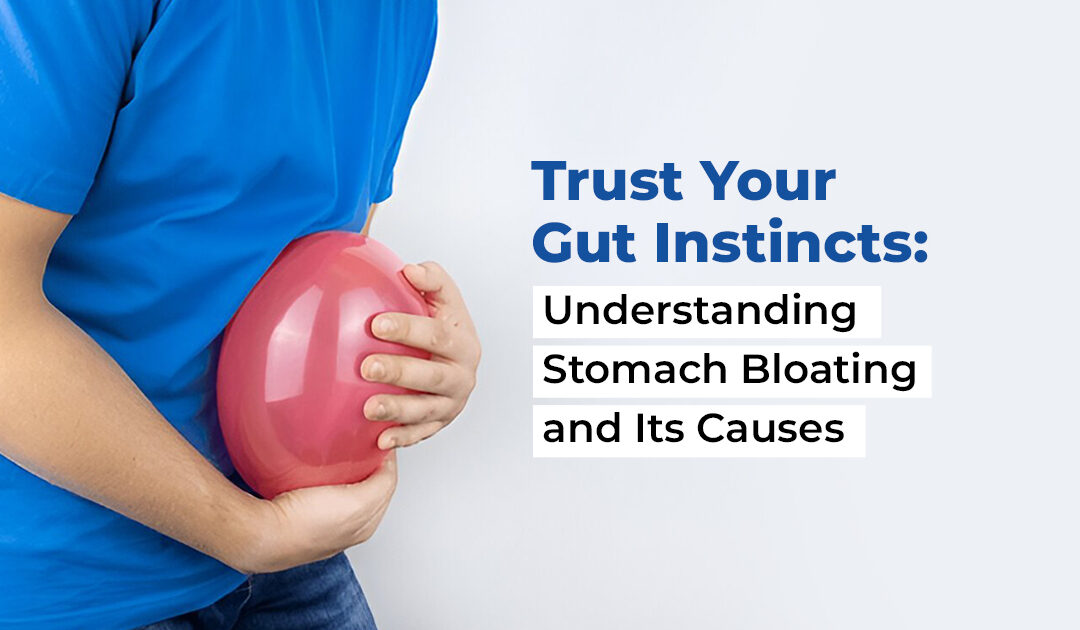10% to 25% of normally healthy individuals report experiencing bloating in their abdomens occasionally. The primary symptom of a bloated stomach is a sensation of constriction, weight, or fullness in the abdomen. A distended (swollen) abdomen may or may not accompany it. From slightly uncomfortable to excruciatingly painful, the sensation can vary. After some time, it normally goes away, but for some people, it keeps coming back. Hormone changes and digestive problems might lead to periodic bloating. If the cause of your swollen stomach remains unidentified, you should consult a doctor.
What Could be the Possible Causes of Your Bloating
1. Gas Gas forms naturally in your body as a part of digestion, but if there is excessive gas formation, it might indicate digestive issues. There could be several reasons why your gut bacteria are unable to assist your digestion properly. It could range from something as simple as overeating to something like specific food intolerance and GI diseases.
2. Digestive Contents These consist of gasses, liquids, and solids. When there is a blockage or obstruction in your digestive tract, or when the muscles that move the digestive contents along are compromised, digestive contents can accumulate in your digestive system. Normal levels of gas will have less room to pass through the digestive tract if there is any accumulation of digestive contents. Additionally, it makes less space in your abdomen for fat and circulatory fluids, which makes everything seem more constricted. Causes of build-up can include constipation, bowel obstructions, motility disorders, and recent weight gain.
3. Hormones Perhaps you’ve found that your menstrual cycle, rather than your digestion cycle, is the one that your stomach bloating seems to follow. Then you are not by yourself. Up to 3 out of 4 women report feeling bloated in their abdomens both before and after their monthly periods. Another common problem during the perimenopausal hormone swings is bloating. Female hormones deserve a specific note when it comes to stomach bloating because they can affect bloating from many angles — fluids, gas, digestive backup — and also your susceptibility to those things.
4. Other Issues Periodic bloating typically has a hormonal, intestinal, or both cause. You may also feel worn out and overall ill from these factors. Your symptoms are usually not worrisome if they ultimately go away. However, you should contact a doctor to rule out other medical causes if your bloated stomach doesn’t go away or grows worse, or if you have other symptoms like a fever or vomiting that indicate a serious illness. These include ascites, pancreatic issues, cancer, gastritis, enteritis, and more.
How Long Does Bloating Typically Last?
Your bloating should go away in a few hours to days if it’s caused by something you ate, or drank, or by hormonal changes. It won’t go away till you start spitting if you are constipated. All of these can be aided by drinking water, exercising, and drinking herbal teas. Seek medical assistance if it doesn’t go away or gets worse.
Depending on why you are experiencing bloating, there are a few ways to get some relief. It is advisable to get a professional diagnosis to understand the root of your problems, but among some remedies that you can try at home for temporary relief, you can try herbal teas, peppermint oil, antacids, probiotics, regular exercise, and more. If your bloating is caused by diet or alcohol, you can take preventive measures by eating enough fiber, drinking enough water, and regular exercise. Avoiding processed foods, noticing foods you are sensitive to, trying an elimination diet with the professional help of a dietician, and trying targeted probiotics, can also be of help.
You should see your doctor if:
- The bloating gets worse
- Persists longer than a week
- Is painful,
- Is accompanied by fever, bleeding or vomiting.
It is not a nice sensation to have an enlarged stomach. Even though it’s a typical occurrence and normally only lasts a short while, you could get tired of the cycle. Finding the cause of the issue may require a small amount of concentrated attention, but it can be highly beneficial. Consider keeping track of your symptoms and their triggers in a journal. Keep in mind stress, hormones, and nutrition. If in doubt, see a specialist for advice on how to proceed with your notes. Medical tests can be useful even though the various causes of bloating can be complicated and challenging to understand. Always get medical help if your symptoms are severe or ongoing.

